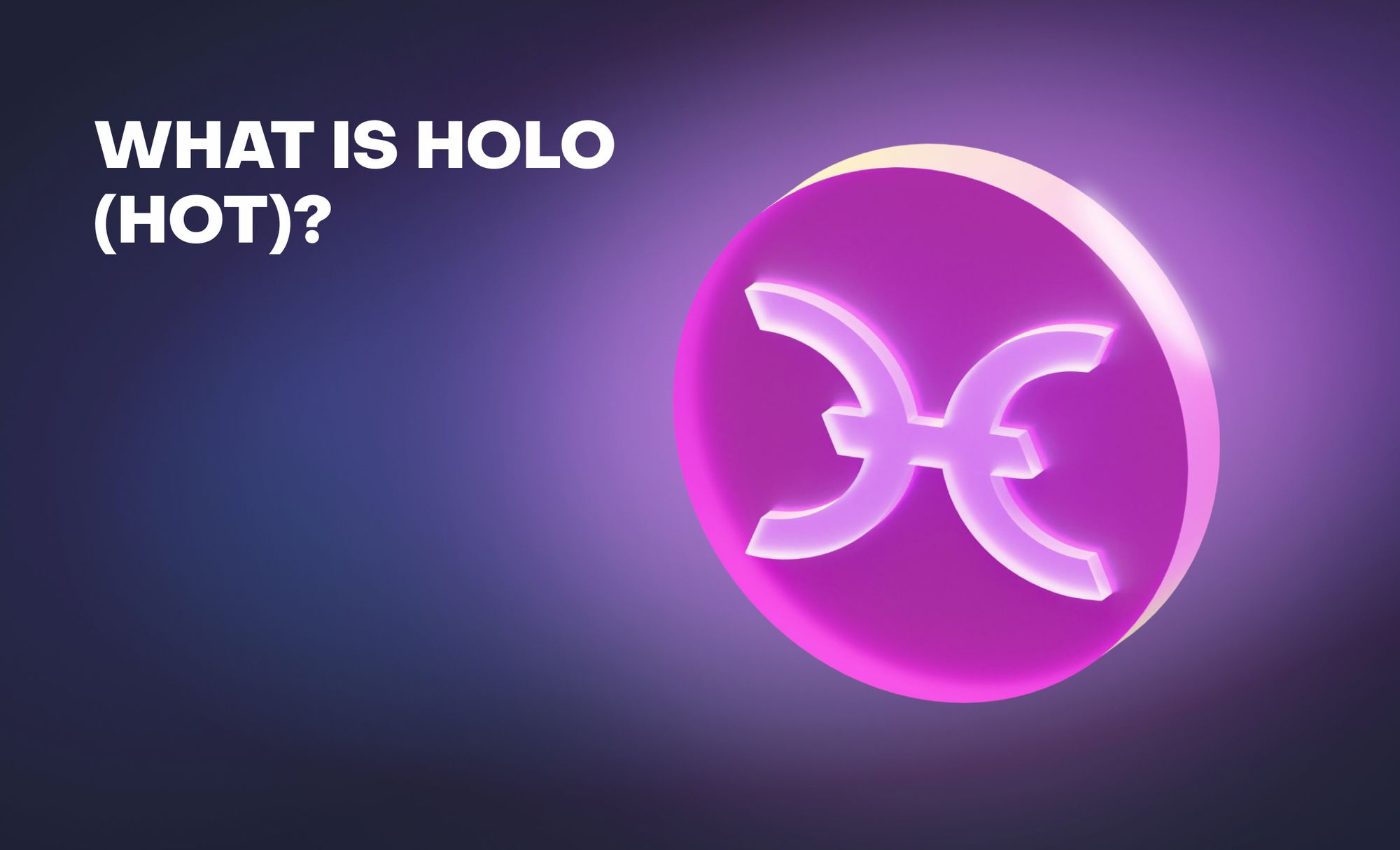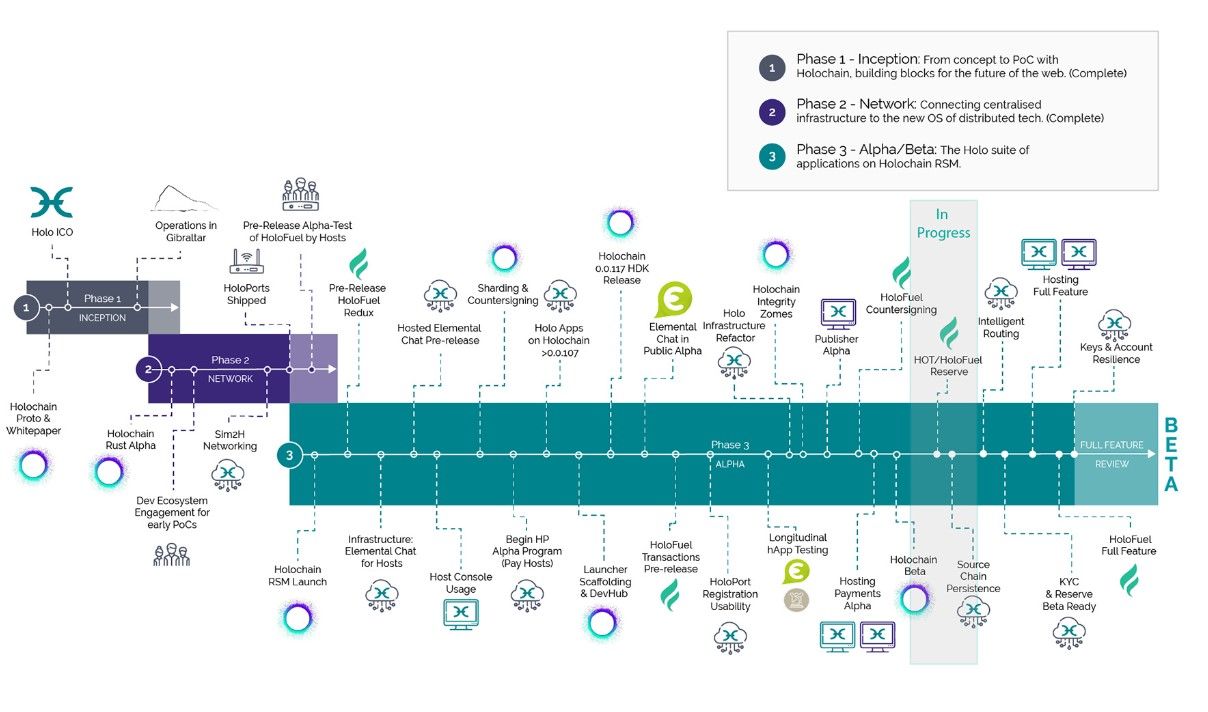
Table of contents
Holo (also known as Holochain) is a cryptocurrency project that aims to redefine peer-to-peer hosting using blockchain technology.
Much like Airbnb disrupted the hotel industry by enabling anyone to become a host, Holo is aiming to enable anyone with a computer to earn revenue for hosting peer-to-peer applications.
Let’s explore more about Holo as well as its native cryptocurrencies: HoloToken and HoloFuel.
History of Holo
The history of Holo can be traced back to its inception in 2017. The project was founded by Arthur Brock and Eric Harris-Braun, who recognized the limitations of the current centralized hosting infrastructure and envisioned a decentralized alternative.
In 2018, Holo conducted an Initial Community Offering (ICO) to raise funds for its development. The ICO raised ~$20,649,000, and it allowed Holo to gather the necessary resources to build its vision. Important milestones and developments in the project followed soon after. In 2019, Holo launched its Holochain technology, which serves as the underlying infrastructure for the Holo ecosystem. Holochain is a framework that enables decentralized applications (dApps) to run without the need for traditional blockchain consensus mechanisms, offering a more scalable and efficient alternative.
Since then, Holo has made significant progress. In 2020, the project released HoloPort, a plug-and-play hardware device built for hosting Holochain apps. The HoloPort acts as a personal server, enabling users to host and provide computing power to decentralized applications. In 2022, the project launched the Holochain Developer Education Initiative, committing upwards of $2 million to build and foster an ecosystem of developers.
How Does Holo Work?
Holo relies upon peer-to-peer (P2P) hosting and distributed computing. Unlike traditional hosting models where data is stored on centralized servers, Holo leverages a distributed network of devices to host applications and content. This decentralized approach ensures greater security, privacy, and scalability.
At the core of Holo's technology is Holochain. Holochain is a framework that enables developers to build distributed applications using their preferred programming languages. It provides a scalable and efficient infrastructure by leveraging agent-centric architecture. Instead of relying on global consensus, Holochain uses a peer-to-peer validation system, where each user maintains their own chain of transactions and validates the transactions of others.
One example of an innovative project built with Holochain is the Internet of Energy Network (IOEN) — a software protocol to coordinate devices that produce, consume, or store electricity.
HoloToken Vs. HoloFuel
HoloToken (HOT) is a placeholder and an IOU for HoloFuel. HoloFuel is similar to using ETH as gas on the Ethereum network. HoloFuel and HOT are designed differently and have different purposes. HoloFuel is designed to perform billions of daily micropayments (a.k.a. microtransactions) for hosting services and it works P2P. Meanwhile, HoloToken is an ERC-20 token that is primarily used for trading on crypto exchanges. HoloToken can be exchanged for HoloFuel at a 1:1 ratio.
HOT max supply is 177 billion. HoloFuel has a dynamic supply rather than a fixed supply. This means the HoloFuel supply will fluctuate according to market needs. The cumulative supply of HoloFuel will always be 0, just like credit and debit on a balance sheet.
Main Features of Holo
- Scalability: Holo's peer-to-peer hosting model allows for horizontal scaling, meaning the network can handle increased demand by simply adding more devices to the network. This approach ensures that the Holo ecosystem can accommodate a growing user base without sacrificing performance.
- Security and Privacy: By decentralizing hosting, Holo reduces the risk of single points of failure and data breaches. Additionally, since each user maintains their own chain of transactions, data privacy is enhanced, as sensitive information is not stored on centralized servers.
- Incentives and Rewards: HoloFuel serves as the currency within the Holo ecosystem. Users who contribute computing resources to host applications are rewarded with HoloFuel, incentivizing participation and creating a self-sustaining ecosystem.
What is Special About Holo?
Holo stands out from other cryptocurrency projects due to its unique approach to hosting and distributed computing. Some key points that highlight the advantages of Holo include:
Key Points About Holo
- Energy Efficiency: Holo's architecture requires significantly less energy compared to traditional blockchain systems. By leveraging the computing power of individual devices, the network consumes fewer resources, making it more environmentally friendly.
- Accessibility: Holo enables anyone with a computer or HoloPort device to participate in the network and contribute to the hosting infrastructure. This inclusivity empowers individuals to become active participants in the digital economy.
- Diverse Applications: The Holo ecosystem provides a platform for developers to create and deploy a wide range of decentralized applications (dApps). From social media platforms to decentralized marketplaces, Holo opens up possibilities for innovative and diverse applications that can disrupt traditional industries.
How to Buy HOT?
You can purchase HOT tokens by following these steps:
- Choose a cryptocurrency exchange: Find a reputable exchange that lists HOT tokens.
- Create an account: Sign up for an account on the chosen exchange and complete the necessary verification processes, such as KYC (Know Your Customer) requirements.
- Deposit funds: Deposit funds into your exchange account. This can typically be done by transferring cryptocurrencies like Bitcoin (BTC) or Ethereum (ETH) to your exchange wallet.
- Place an order: Once your funds are deposited, navigate to the trading section of the exchange and search for the HOT token. Place a buy order for the desired amount of HOT tokens, specifying the price you're willing to pay.
- Store your HOT tokens: After the purchase is complete, transfer the HOT tokens from the exchange to your personal wallet for enhanced security. Choose a crypto wallet that supports HOT tokens. Options include hardware wallets like Ledger or software wallets like AtomicDEX.

The Future of Holo
Holo (HOT) is a pioneering project that aims to revolutionize peer-to-peer hosting through its decentralized infrastructure powered by Holochain technology. By leveraging the advantages of distributed computing and incentivizing participation, Holo offers a scalable, secure, and energy-efficient alternative to traditional hosting models.
Looking ahead, Holo has ambitious plans for the future of its ecosystem. Having reached its Beta release, the project is currently adding key infrastructure for resilience and security that moves it closer to a full-feature Alpha release.
With its unique features and advantages, Holo opens up new possibilities for dApps. As Holo continues to evolve, it has the potential to disrupt centralized hosting services and empower individuals to take control of their digital experiences.
HODL and Trade Holo (HOT) on AtomicDEX
AtomicDEX is a non-custodial DeFi wallet, cross-chain bridge, and cross-chain decentralized exchange (DEX) all rolled into one app. AtomicDEX is accessible on any device, browser, or OS. The app provides native support for HOT as well as other popular cryptocurrencies such as BTC, ETH, DOGE, MATIC, and more.
AtomicDEX is available as a web-browser application. Alternatively, you can download the mobile crypto wallet or desktop crypto wallet.




